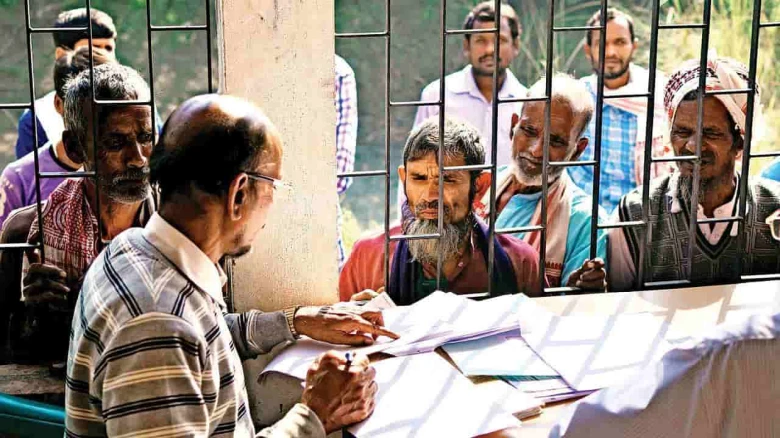International

In July, the panel was formed following a meeting between chief minister Himanta Biswa Sarma and Assamese Muslims from various fields, including writers, doctors, cultural workers, lecturers, historians, and musicians, to discuss the community's socio-economic challenges.
Digital Desk: The recommendation of the Assam government's panel to recognize Assamese Muslims as a distinct group has sparked debate over whether this will benefit the community or will fuel more division among Muslims.
Recently, the panel suggested that the Assamese Muslim community be "identified and documented" through issuing notification and identity cards or certificates, as well as a census.
The "indigenous" Muslim community, which is distinct from Bengali-speaking Muslims who moved from present-day Bangladesh, is divided into four primary groups that claim to have originated in Assam several centuries ago. The Goriyas and Moriyas (from Upper Assam), the Deshis (from Lower Assam), and the Julha Muslims are among these communities (from the tea gardens).
In July, the panel was formed following a meeting between chief minister Himanta Biswa Sarma and Assamese Muslims from various fields, including writers, doctors, cultural workers, lecturers, historians, and musicians, to discuss the community's socio-economic challenges. During the discussion, CM Sarma highlighted the importance of protecting and preserving the "uniqueness of the indigenous Assamese Muslims."
The panel, divided into seven sub-committees, issued its report on April 21. It also presented recommendations on educational issues, political representation, health, skill development, and women's empowerment. The chief minister accepted the suggestions, calling them "implementable," and noted that the committee had also recognized Assamese Muslims. "We've agreed to the definition... Now it will be evident who the target group is and what work needs to be done for them," he added.
Official recognition is seen by some in the community as a way to resolve their "identity issue," as they are frequently confused with Bengali-speaking Muslims. Syed Muminul Aowal, the leader of the Janagosthiya Samannay Parishad (JSPA), an umbrella body of more than 30 "indigenous" organizations, stated Assamese Muslims have "the same names as Bengali Muslims and are often lumped in with them,"
Pointing out how difficult it is to define indigenous in a state like Assam and the vagueness of the term All India United Democratic Front (AIUDF), legislator Aminul Islam said that the panel's ideas were part of a "political rhetoric" to isolate Bengali Muslims further.
"They're using this to create yet another split among Muslims. We haven't had a base year to identify who is an Assamese till now. There are also several marriages between Assamese and Bengali Muslims. How can one locate such a family?," he asked.
The move was not good news for Bengali Muslims. However, Assamese Muslims have long been deprived of advantages, which is a positive move for them. But, absolutely, this will further divide Bengali Muslims and isolate them," said a Congress legislator who did not want to be identified.
In February 2020, a census for Assamese Muslims was suggested for the first time. Following a meeting with community members, then-state Minorities Minister Ranjit Dutta confirmed plans to hold the census, citing the 2019 Budget, which included provisions for a "Development Corporation for Indigenous Muslims" for the community's "holistic development" as well as a "socio-economic census."
Reportedly, there was little progress on the issue until April 2021, when Aowal's JSPA, which is not affiliated with the government, published a website to perform an Assamese Muslim census "modelled after the National Register of Citizens (NRC)." The exercise, however, did not take off.
According to the Congressman, there had been talk about other such endeavors, but "no one wanted to touch it because it was a hot potato." "However, the chief minister is an astute politician who understands that this will benefit him politically," he added.
The recommendations, according to Aowal, are good, but they need to be examined. "The suggestions allude to identification for the 'Assamese Muslim' in their existing form but it is essential that specific groups such as Goriyas, Moriyas, Deshis, and Julas be identified, because the meaning of indigenous is unclear," he added.
"It would ultimately not be implemented because it was not constitutionally legal and cautioned that harm would be done and the Bengali Muslim community would be further marginalised," it said.
The plan is currently in the recommendation stage, according to state minority minister Chandra Mohan Patowary.
"The chief minister will be presented with the reports of the seven committees," he said.
"Yes, he did say the proposals were all implementable, but he also added that it would be done in three parts — short term, medium term, and long term — and matters would be taken ahead properly," he added.
Leave A Comment